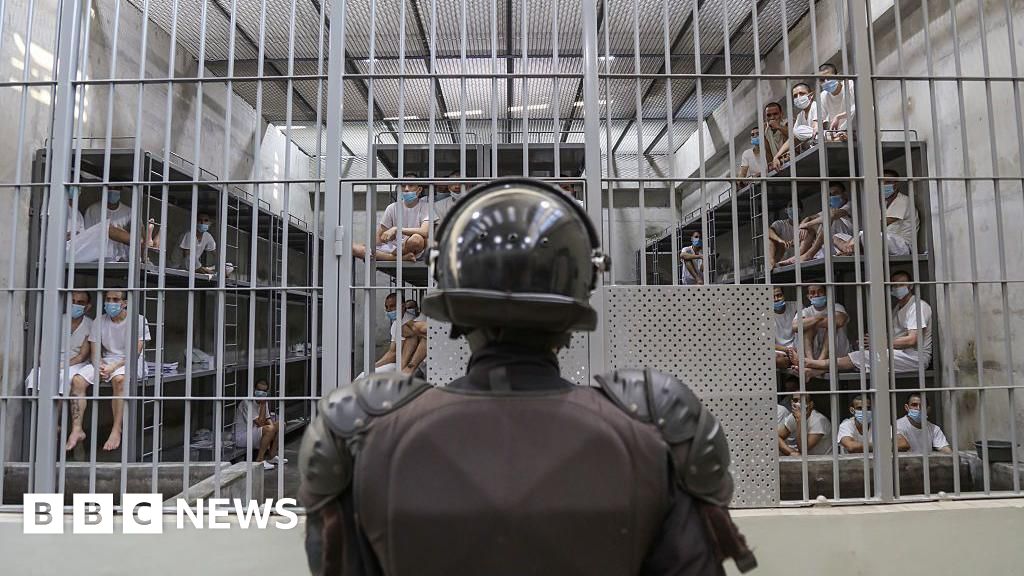Supreme Court Temporarily Halts Deportation of Alleged Venezuelan Gang members
By Archyde.com National News Desk |
WASHINGTON — The U.S. Supreme Court has issued a temporary stay of deportation for a group of Venezuelan nationals accused of gang affiliation. The order provides a temporary reprieve while legal challenges proceed concerning their detention and potential removal under an obscure 18th-century law.
Alien Enemies Act Invoked
The legal battle centers on the Trump administration’s use of the 1798 Alien Enemies Act, a statute originally designed for wartime scenarios. the act grants the president broad authority to detain and deport citizens of “enemy” nations without the customary due process afforded in immigration proceedings.
Former President Trump had accused the Venezuelan gang Tren de Aragua of “perpetrating, attempting, and threatening an invasion or predatory incursion” on U.S. territory, leading to the invocation of the act. Critics argue that the request of this law, last widely used during World War II to intern Japanese Americans, raises serious constitutional concerns.
The American Civil Liberties Union (ACLU) filed suit on behalf of the detained Venezuelans,arguing they were denied their right to contest their removal in court and that notices of deportation were issued in English,despite some detainees only speaking Spanish. The lawsuit states, “Without this Court’s intervention, dozens or hundreds of proposed class members may be removed to a possible life sentence in El Salvador with no real possibility to contest their designation or removal.”
While the Supreme Court initially ruled on April 8 that the Trump administration coudl use the Alien Enemies Act, it stipulated that deportees must be given a fair opportunity to challenge their removal. the current stay acknowledges concerns raised about the fairness of the process.
Circuit Split and Supreme Court Intervention
The case gained urgency after conflicting rulings in lower courts. A lower court had temporarily blocked these deportations on March 15, creating a circuit split that prompted the Supreme Court’s intervention.
Justices Clarence thomas and Samuel alito dissented from the stay order.This indicates a potential division within the court regarding the scope and application of the Alien Enemies act, suggesting the legal battle could continue for months, if not years.
Deportations to El Salvador and Related Cases
The Trump administration had been actively deporting Venezuelans to El Salvador, a country with which the United States has a controversial agreement regarding asylum seekers. According to a senior administration official, as of April 8, 137 out of 261 Venezuelans deported to El Salvador were removed under the alien Enemies Act.
The deportations have been met with widespread criticism due to El Salvador’s high levels of gang violence and human rights concerns. International human rights organizations have documented instances of torture, extrajudicial killings, and arbitrary detention within the Salvadoran penal system.
The Case of Kilmar Ábrego García
The legal challenges have also brought scrutiny to other deportation cases,most notably that of Kilmar Ábrego García,an El Salvadoran national mistakenly deported by the U.S. government. While the government claims Ábrego García is a member of the MS-13 gang, his lawyer and family deny the allegations, emphasizing that he has never been convicted of a crime.
The Supreme Court unanimously ruled that the government should facilitate bringing back Mr. Ábrego García, but the Trump administration has stated he will “never” live in the U.S. again. Senator Chris Van Hollen,a Democrat from Maryland,visited Mr. Ábrego García in El Salvador and said he had been moved from the mega-jail Cecot (Terrorism Confinement Center) to a new prison.
Implications and Future Developments
The Supreme Court’s decision to temporarily halt the deportations signals a growing concern about due process and the potential for misapplication of the Alien Enemies Act. It also highlights the complex challenges of addressing gang violence while upholding constitutional rights.
The Biden administration, while adopting a somewhat less confrontational tone on immigration, has continued to grapple with the issue of gang-related crime. In his second inaugural address in January, then-President Trump pledged to “eliminate the presence of all foreign gangs and criminal networks bringing devastating crime to US soil,” a sentiment that resonated with many Americans concerned about border security and public safety.
Advocates for stricter immigration enforcement argue that the Alien Enemies Act provides a necessary tool to protect U.S.citizens from perilous criminals. they contend that the government has a right to deport individuals who pose a threat to national security, even if they have not been convicted of a crime. Though, critics maintain that the law is overly broad and susceptible to abuse, possibly leading to the deportation of innocent individuals based on flimsy evidence or unsubstantiated accusations.
The Supreme Court’s ultimate decision in this case could have far-reaching implications for immigration law and the balance between national security and individual liberties. the stay of deportation allows for further legal scrutiny and ensures that the rights of the detained Venezuelans are protected, at least for now.
FAQ: Alien Enemies Act and deportation
| Question | Answer |
|---|---|
| What is the Alien Enemies Act? | An 18th-century law allowing the president to detain and deport citizens of “enemy” nations during wartime or declared national emergencies. |
| When was the Alien Enemies act last used? | most notably during World War II to intern Japanese Americans. |
| Who is challenging the use of the Alien Enemies Act in this case? | The American Civil Liberties Union (ACLU) is representing the detained Venezuelans. |
| What are the main arguments against using the Alien Enemies Act in this case? | Concerns about due process, lack of opportunity to contest deportation, and potential human rights violations in El Salvador. |
| What is the current status of the deportation proceedings? | The Supreme Court has temporarily halted the deportations while legal challenges proceed. |
“`
Supreme court Halts Deportations: interview with Immigration Law Expert Dr. Anya Sharma
By Archyde.com National News Desk |
Introduction
The U.S.Supreme Court’s temporary stay on the deportation of alleged Venezuelan gang members has sparked a complex legal and ethical debate. To shed light on the implications, Archyde.com National News Desk spoke with Dr. Anya Sharma,a leading expert in immigration law and constitutional rights. Dr. Sharma is a professor at the Georgetown University Law Centre and specializes in the submission of the Alien Enemies Act.
Interview
Archyde: dr. Sharma, thank you for joining us. Can you provide some context on the Alien Enemies Act and why its invocation has become so controversial in this case?
Dr. Sharma: Certainly. The Alien Enemies act, dating back to 1798, grants the President formidable power to detain and deport citizens of “enemy” nations, typically during wartime. The controversy here stems from applying this law to alleged gang members, which is a novel interpretation and raises significant due process concerns, particularly as people have not been convicted of a crime.
Archyde: The article mentions the lack of due process for the detained Venezuelans. Could you elaborate on the specific rights they may be missing?
dr. Sharma: Absolutely.In typical immigration proceedings, individuals have the right to challenge their deportation in court. They can present evidence, cross-examine witnesses, and make their case before an immigration judge. Under the Alien Enemies Act,these rights are considerably curtailed,and as this legislation is used in this case,the legal argument is the detainees did not even have the right to appear in court at all.
archyde: The article notes that deportations had been occurring to El Salvador. What are the concerns about sending individuals to El Salvador in this context?
Dr. Sharma: El Salvador currently has significant issues with gang violence, human rights and due process – including torture, extrajudicial killings, and arbitrary detention. Deporting individuals to such an environment, especially if there are questions about the accuracy of the gang affiliation claims, is a grave concern.
Archyde: the case of Kilmar Ábrego García,mistakenly deported to El Salvador,highlights the potential for errors. How does this case underscore the broader issue?
Dr. Sharma: It’s a perfect illustration of the risks involved. If the government can mistakenly deport someone without adequate safeguards, the system is failing. the fact that Mr. Ábrego García, who has never been convicted of a crime, was deported exemplifies the devastating consequences of misidentification and lack of due process.
Archyde: Justice Thomas and Alito dissented from the stay order. What does that suggest about divisions on the Supreme Court regarding the Alien enemies Act and these deportations?
Dr. Sharma: Their dissent reveals a potential split on the court. They may believe the Trump administration’s original invocation of the act was justified, or that the court shoudl not interfere with executive branch discretion. This suggests the legal battle is far from over, and we can expect more debates.
Archyde: How might the ultimate Supreme Court decision on this case impact immigration law in the future?
Dr. sharma: The ruling will have far-reaching effects. If the Court upholds the use of the Alien Enemies Act in this context, it could open the door for broader application of this rarely used law. If the Court sides with the challengers, it will safeguard individual liberties and set limitations on how the government responds to perceived national security threats. The decision will heavily shape the balance between protecting national security and upholding individual rights within immigration law.
Archyde: in your opinion,are there instances where the Alien Enemies Act,as it currently stands,is an appropriate tool for the federal government to apply?
Dr. Sharma: That’s a complex question. Historically, the act was designed for explicit wartime scenarios, as a notable example in situations involving sabotage or espionage. Applying it where there are no war-time conditions raises serious issues in the context of due process, potential civil liberties impacts, and checks and balances. The core issue is the potential for its use against those who pose no real threat to national security or without enough evidence to act. This requires very careful consideration.
Archyde: Dr. sharma,thank you very much for your time and insights.
Dr. Sharma: My pleasure.
Conclusion
The Supreme Court’s involvement in the deportation of alleged Venezuelan gang members highlights the ongoing tension between national security concerns and the protection of due process. The outcome of this case will have a lasting impact on immigration law and the rights of non-citizens in the United States.








